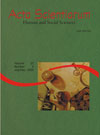<b>A aplicação da teoria marxista de Estado na interpretação do golpe militar de 1º de abril de 1964</b> - DOI: 10.4025/actascihumansoc.v28i2.154
Resumo
Expomos neste artigo o relato do processo histórico que redundou na deposição do presidente João Goulart no dia 1º de abril de 1964. A preocupação em observar a cronologia dos fatos é o procedimento metodológico que orienta este relato. Em termos factuais, pretende-se construir uma interpretação para as seguintes questões: se o presidente da República dispunha do controle das Forças Armadas e dos sindicatos por que foi deposto sem manifestar qualquer reação? A deposição do chefe de Estado decorreu de sua intenção de realizar reformas estruturais com o apoio da classe trabalhadora? Em termos teóricos, pretende-se verificar se foi o caráter burguês do Estado que inviabilizou um governo apoiado por sindicatos e por um partido de base operária confinado à ilegalidade. Com base na teoria marxista de Estado, concluímos que Goulart foi deposto por não considerar a distinção entre política institucional e política revolucionária.Downloads
DECLARAÇÃO DE ORIGINALIDADE E DIREITOS AUTORAIS
Declaro que o presente artigo é original, não tendo sido submetido à publicação em qualquer outro periódico nacional ou internacional, quer seja em parte ou em sua totalidade.
Os direitos autorais pertencem exclusivamente aos autores. Os direitos de licenciamento utilizados pelo periódico é a licença Creative Commons Attribution 4.0 (CC BY 4.0): são permitidos o acompartilhamento (cópia e distribuição do material em qualqer meio ou formato) e adaptação (remix, transformação e criação de material a partir do conteúdo assim licenciado para quaisquer fins, inclusive comerciais.
Recomenda-se a leitura desse link para maiores informações sobre o tema: fornecimento de créditos e referências de forma correta, entre outros detalhes cruciais para uso adequado do material licenciado.


























